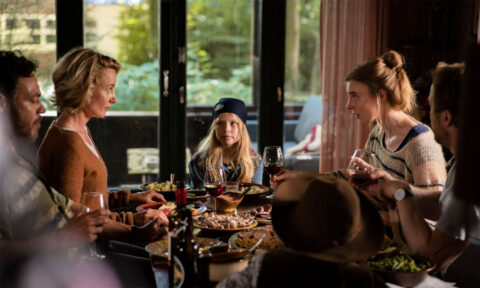While others might believe we are in a new generation of exciting horror movies, I find that the hyperbole surrounding most releases in the last ten years has been somewhat unwarranted. So much of the so-called horror renaissance has been rooted in obvious metaphors that their exercises lose their impact. Should you be able to sum up what the evil represents almost right away? Now we have a lot of horrors that fit neatly with Important Themes;
Hereditary (Ari Aster, 2018) — Mental Illness;
Relic (Natalie Erika James, 2020)— Dementia;
Babadook (Jennifer Kent, 2014) — Depression;
And so on. The problem is once you sort of clock where the movie is going and where it is taking you, the horror is diminished as it fits within these neat boxes.
For me the best recent ones, such as Get Out (Jordan Peele, 2017) and Kindred (Joseph Marcantonio, 2020), also sprinkle in both humour and thriller elements, giving us something to root for as the protagonists figure out they’re in a fucked up situation and need to get out, pronto. There’s a sense of character here beyond the trope, making their plight identifiable.
But these films are few and far between, with the horror movies I’ve seen often using derivative metaphors to cover up their lack of genuine depth, or the feeling that anything can happen. Simply put, they seem a too over-planned and over-thought; too cleanly executed. So, I can’t say horror is the genre I get most excited about. But upon a recommendation from a friend, I did pop on Speak No Evil, which is probably the most genuinely terrifying film I’ve seen in years. And it’s got just as much to do with how it goes about the story as what the story actually contains.
It’s a Danish film. Denmark is the land of Dogme 95, a strict filmmaking code created in the 90s by Thomas Vinterberg and Lars Von Trier to reduce artifice from cinema. Handheld cameras, realistic dialogue, shooting on video, avoiding special effects: these all contributed to works of psychological rigour and exciting screen dynamics. Speak No Evil is not a Dogme film, but the roots of that movement can be felt in the way that third-time director Christian Tafdrup tackles the very awkwardness that goes at the heart of human interaction, making a film that feels so terrifying because the characters feel recognisable right until the very end.
Bjørn (Morten Burian) and Louise (Sidsel Siem Koch) are a mild-mannered Danish couple on holiday in Tuscany. Things would be idyllic if it wasn’t for the booming, every-instrument-in-the-orchestra score by Sune Kølster, which places everything under a sense of mystery and foreboding menace. It seems on-the-nose at first. But when I reached the end of the film, it felt understated.
They are travelling with their daughter Agnes and are happy to bump into a forthright Dutch couple on their trip, Patrick (Fedja van Huêt) and Karin (Karina Smulders), and their son Abel (Marius Damslev). They click instantly, sharing wine, food and conversation over long, languid, hot summer days. Later, when they are back in Denmark they receive an invitation to visit the couple at their holiday house in Holland for the weekend. But when they visit, they (of course, lol) realise that these two people are not all they seem.
It starts with the smallest things. Louise is a vegetarian, but Patrick keeps forgetting, giving her meat to try. He plays the music too loud in the car. Karin talks to Louise’s daughter in Dutch. It turns out that these are not just forthright, stereotypical Dutch people; they’re actually downright rude. But the Danes, try as they might, rooted in a culture of politeness, cannot challenge them properly, and when they feel even more upset, they cannot even leave properly, gaslight at each attempt by the Dutch that they didn’t mean to upset them. And it gets worse. Probably worse than you could even imagine.
Speak No Evil hardly reinvents the horror rulebook, playing with most of the same tropes that have been well-worn by the genre. But its effectiveness to me doesn’t lie in its adherence to genre norms, but the very casual way it shows how the desire not to be rude and to accommodate other people’s toxic behaviour can place us in danger, all caught with seemingly-improvised dialogue, stilted EU English, handheld camerawork, and uneasy body language. The first two-thirds could even be an effective comedy of manners. But, once the structure locks rigidly into place, and the true tragedy of the situation seeps in, this unerring sense of politeness allows the film to delve truly depraved depths, resulting in one of the most terrifying endings in modern cinema.
This closely observed understanding of everyday reality is what makes it so genuinely scary. It will feel so familiar to anyone who has visited a toxic friend, or weird in-laws, or been on an ugly work-trip. Everyone knows someone, who after doing something unpleasant, can find a way to make it about your behaviour, before going back to the same unpleasantness once again. The ideas of Speak No Evil aren’t clumsy metaphors, but rooted in a genuine understanding of the perils of human interaction.
The Dutch might complain about the negative stereotypes; the Danes might feel like they look a bit wimpish; but perhaps for anyone else watching the film, it’s a reminder of what can happen when you are more afraid of coming across as rude than actually confronting other people’s toxicity. Perhaps life itself is a horror film. Perhaps there are no need for metaphors.

Redmond is the editor-in-chief of Journey Into Cinema.
